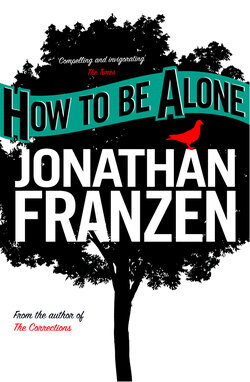How to be Alone

Реклама. ООО «ЛитРес», ИНН: 7719571260.
Оглавление
Jonathan Franzen. How to be Alone
JONATHAN FRANZEN. HOW TO BE ALONE. ESSAYS
Copyright
Praise
DEDICATION
A WORD ABOUT THIS BOOK
MY FATHER’S BRAIN
IMPERIAL BEDROOM
WHY BOTHER?
LOST IN THE MAIL
ERIKA IMPORTS
SIFTING THE ASHES
THE READER IN EXILE
FIRST CITY
SCAVENGING
CONTROL UNITS
MR. DIFFICULT
BOOKS IN BED
MEET ME IN ST. LOUIS
INAUGURATION DAY, JANUARY 2001
If you enjoyed How to be Alone, check out these other great Jonathan Franzen titles
ABOUT THE AUTHOR
ALSO BY JONATHAN FRANZEN
About the Publisher
Отрывок из книги
From the reviews of How to Be Alone:
‘Stunning … Each page is studded with irresistible writing which leaves you breathless for more. Franzen’s strength is his ability to combine a rigorous intellectual approach with an upbeat energy, using language which touches the heart as surely as the head’
.....
For six decades after Alois Alzheimer’s autopsy of Auguste D., even as breakthroughs in disease prevention and treatment were adding fifteen years to life expectancy in developed nations, Alzheimer’s continued to be viewed as a medical rarity à la Huntington’s disease. David Shenk tells the story of an American neuropathologist named Meta Naumann who, in the early fifties, autopsied the brains of 210 victims of senile dementia and found sclerotic arteries in few of them, plaques and tangles in the majority. Here was ironclad evidence that Alzheimer’s was far more common than anyone had guessed; but Naumann’s work appears to have persuaded no one. “They felt that Meta was talking nonsense,” her husband recalled.
The scientific community simply wasn’t ready to consider that senile dementia might be more than a natural consequence of aging. In the early fifties there was no self-conscious category of “seniors,” no explosion of Sun Belt retirement communities, no AARP, no Early Bird tradition at low-end restaurants; and scientific thinking reflected these social realities. Not until the seventies did conditions become ripe for a reinterpretation of senile dementia. By then, as Shenk says, “so many people were living so long that senility didn’t feel so normal or acceptable anymore.” Congress passed the Research on Aging Act in 1974, and established the National Institute on Aging, for which funding soon mushroomed. By the end of the eighties, at the crest of my annoyance with the clinical term and its sudden ubiquity, Alzheimer’s had achieved the same social and medical standing as heart disease or cancer—and had the research funding levels to show for it.
.....